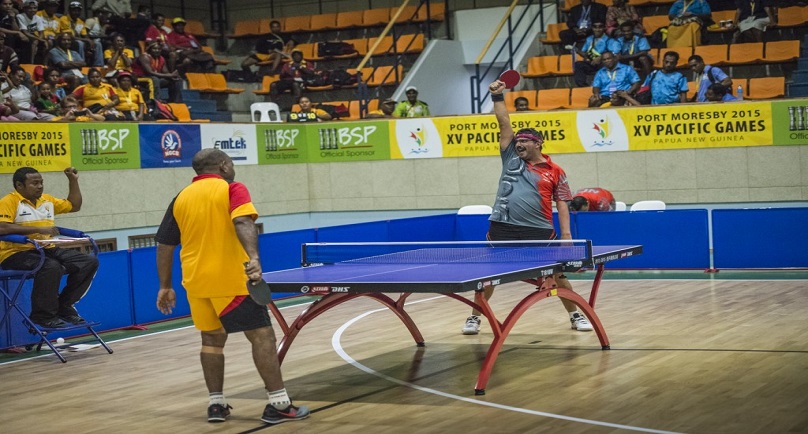By Daniel Kerwin, Port Moresby 2015 Games News Service
PORT MORESBY, July 10 – After a groundbreaking Games at Noumea 2011 that saw para-athletes competing for the first time in four different athletics events, the Port Moresby 2015 Pacific Games introduced a second sport for them to compete in – ambulant and seated table tennis.
New Caledonia won gold in both the women’s and men’s ambulant singles, a category for person’s with disabilities who are able to play while standing. Delphine Andre (NCL), a 15-year-old who also holds a world championship in swimming, won the women’s event, and Avelino Monteiro (NCL) won gold on the men’s side.
Fiji took both golds in the seated singles, the category for competitors in wheelchairs, with Merewalesi Roden (FIJ) taking the women’s title and Iakoba Taberanibou (FIJ) winning on the men’s side.
Roden said having ambulant and seated table tennis at Port Moresby 2015 was the first step to having more para sports.
“Changes don’t happen overnight and I’m glad that this has happened for people to see. We have come out, we have taken part locally, we’ve come up to the national level, and now we are competing in the regional level. I think this is just a big step up.”
“I think most of the nations are moving into a different direction now, looking at inclusiveness, diversity and inclusion. I think this proves it, having persons with disabilities in table tennis.”
Taking place right alongside the able-bodied competition at the Caritas Technical Secondary School, six men and two women competed in the ambulant events, with a further two men and three women competing in seated events.
In fact, in order to stage the seated competition at all, two Papua New Guinean para-athletes were recruited to take up table tennis for the first time just prior to the games .
Vero Paul Nime won the silver medal on the women’s side and Iwakie Tumala, who competed in men’s side, wasn’t awarded a medal due to a Pacific Games rule that says a competitor must win at least one match to earn a medal.
Roden said increasing the number of competitors or even the number of sports available for para-athletes in the next Pacific Games was a popular sentiment among the competitors.
“I would really love to see 10 more people – females and males – with disabilities participating in sports, whether it be para table tennis or basketball, or whatever, I would really love to see more,” Roden said .
Tumala is also eager to see the Pacific Games continue the trend of offering new opportunities for para-athletes to compete in different sports.
“I’d like the Pacific Games to be inclusive, in that when you have the able-bodied basketball, you should have the para basketball as well,” Tumala said.
“I hope the organizers might consider this, and I’m appealing to them to at least create more sports that accommodate para-athletes as well.”
Tumala has competed in a variety of other para sports including swimming and powerlifting for a number of years, but said playing table tennis for the first time has been an eye-opening experience for him.
“I can say [table] tennis changed my life as of today, having experienced the game itself, and having competed in the game itself. It’s fun, entertaining, and inclusive I’d say.”
Taberanibou also lauds the inclusive nature of table tennis in comparison to other sports.
“Table tennis is whether you are para, or old, or anything, you can do it,” Taberanibou said.
“For me, this tournament is to upgrade the para Games, and to acknowledge that all the paras in the Pacific should know that we are not just idles, but we can do something apart from staying at home,” Taberanibou said.
“We are participating in sports so that we can show other paras around the Pacific that they can do it, as all of us here are doing it for table tennis.”
Roden said she thinks her participation in the Games should motivate and empower people, especially women, who have some sort of disabilities.
“I think that this should be encouraging to them, give them hope that life doesn’t end there. Having a disability doesn’t mean that you can’t participate, there’s always space for you to partake in,” she said.
Tumala and Taberanibou instantly became friends through their competition, with Taberanibou already referring to Tumala as his “bubu” (a term for an older relative) and inviting him to compete against him at next year’s Fiji Open.
Tumala is hoping to use his experience to help more disabled people in Papua New Guinea learn how to play table tennis.
“Table tennis has just been introduced, so I will definitely take it head on and introduce the sport in my hometown, Lae, and hopefully in Mount Hagen, and we could have table tennis expand in Papua New Guinea.”
Although the wheels of change have already been set in motion, the athletes are aware that unless the demand for para sports increases in the South Pacific, they will not have an increased presence at future Games.
Taberanibou issued a challenge to disabled people around the Pacific to follow the lead of para-athletes like himself and get involved in sports.
“Maybe in four years time, table tennis will be having other parts of the Pacific participating in it,” Taberanibou said.
“I would like to challenge other parts of the Pacific islands – please, don’t stay home, but take one step forward for para.”
For more information visit www.portmoresby2015.com


